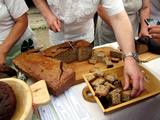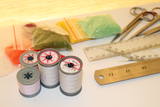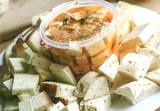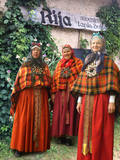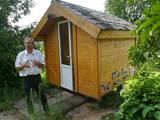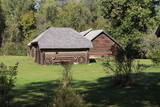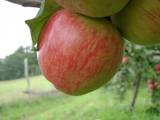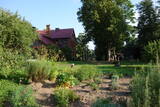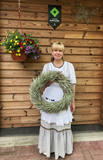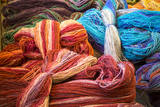| Nr | Name | Beschreibung |
|---|---|---|
|
Um In der Altstadt von Cēsis ein warmes Brot zu bekommen, kann man nicht nur den Anweisungen, sondern auch dem verlockenden Brotgeruch folgen, das durch den Bogen direkt zur Bäckerei führt. Das Brot wird aus den in Lettland biologisch angebauten Körnern gebacken, es wird mit natürlichem Sauerteig hergestellt. Brotverkostung, Erzählung über die Zutaten, Gärung und Backen eines gesunden Brotes. |
||
|
Radošajā mājā Latvietes pūrs var apgūt praktiskās iemaņas rokdarbu veidos, kas nepieciesami latviešu tautas tērpu darināšanai – baltie un krāsainie darbi, zīļu vainagu darināšana, adīšana, tamborēšana, tilla izšuvumi, pīto un austo jostu darināšana u.c. Saimniece pati pārzina dažādus rokdarbu veidus un to tehnikas, nepieciešamības gadījumā tiek pieaicināti sava aroda meistari. Ir zināšanas par latviešu tautas tērpa novadu īpatnībām, saimniece labi zina tautas tērpu attīstības vēsturi un pielietojumu
|
||
|
Im Birkenhof wird sehr schmackhaftes Roggen- und Weizenbrot in alter Tradition gebacken. Den besonderen Geschmack gewinnt das Brot durch das Backen im über 70 Jahre alten Backofen. Brot kann man bestellen oder nach vorheriger Vereinbarung auch selbst backen. |
||
|
Die Gaststätte wurde in einem alten Blockhaus in Nähe der Liepupe-Kirche errichtet. Im ehemaligen alten Stall neben der Gaststätte werden nach Rezepten der Vorfahren Fleisch- und Wurstwaren hergestellt, die man im Fleisch- und Wurstladen Sidrabiņi kaufen kann. Es werden Führungen und Verkostungen angeboten. |
||
|
In der Käserei von Eleja kann man nach vorheriger Vereinbarung die im bäuerlichen Betrieb der Familie Malkalns hergestellten Käsespezialitäten verkosten (sieben Käsespezialitäten, auch geräucherter und gereifter Käse). Eine der Käsesorten ist französischer Käse, der in der Zusammenarbeit mit französischem Käsemeister Eriber entstanden ist. Kleine Gruppen können auch den Hof „Bludzi” (7 km von Eleja entfernt) in der Gemeinde Sesava besichtigen. Im Hof bäckt man Brot, verarbeitet Gemüse (Tomatensaft) und stellt andere ländliche Leckereien her. |
||
|
Einer der seltenen Orte, wo eine kleine Gruppe (2 bis 3 Personen) sich in einem Fischerboot auf die See begeben und den Küstenfischfang beobachten kann. In Zusammenarbeit mit anderen Fischern wird diese Möglichkeit auch an größeren Gruppen angeboten. Der auf dem Fluss Svētupe gebaute Neunaugen-Fischzaun unterscheidet sich in seinem Aufbau und in der Art des Fischfangs von den Fischzäunen auf dem Fluss Salaca. |
||
|
Auf dem Hof Untumi werden eine Pferdeherde gehalten und gezüchtet, sowie Pferde gekauft, die den Anforderungen der historisch gezüchteten lettischen Pferderasse entsprechen. Hier kann man in einem Pferch oder in der Umgebung des Hofes unter der Leitung eines Instrukteurs Reitfertigkeiten erlernen. Im Sommer kann man hier mit einem Pferdewagen, aber im Winter – mit einem Pferdeschlitten fahren. Die Pferde werden zu Hochzeiten und anderen Veranstaltungen verwendet. |
||
|
In der alten Getreidedarre des Landgutes von Alsunga befindet sich ein Souvenirgeschäft, in dem man Souvenirs und im Haushalt nützliche Dinge kaufen kann, die in dem Kreis von Suiti hergestellt sind: Tücher (die Kleidung von Suiti zeichnet sich durch lebhafte Farben aus), Handschuhe, Socken, Geschirr, Tees u.a. Hier werden kreative Werkstätte organisiert. |
||
|
"Piebalga medus" is located in Vecpiebalga region, turning off the highway Cēsis – Vecpiebalga – Madona (P30). Beekeeping, apitherapy and narration "About and around bees". Tasting and purchase of beekeeping products. A candlestick workshop is available for visitors. Especially with the fact that the apiary only with Latvian hives. |
||
|
Wooden slat weaving workshop is located in Jelgava county, Sesava parish. Craftswoman is making different type of wooden slat baskets and basketry from pine, linden, aspen and black alder. There are several different categories of baskets, available in different sizes - picknick baskets, baskets for berry and mushroom picking, trays, baskets for firewood, laundry baskets, onion / garlic baskets, baskets for kids, and diverse baskets for daily use. Various inscriptions and drawings are also made on the weavings. They also accept orders for individual orders. In the workshop it is possible to see the wooden slat basket weaving process as well as have the opportunity to learn to make your own basket. |
||
|
In der Mühle lässt sich der Wollverarbeitungsvorgang auf 100 Jahre alten Geräten nachverfolgen, hier werden Wolldecken und mit Schafwolle gefüllte Kissen in Handarbeit hergestellt, sowie Souvenire, die man kaufen und bestellen kann. Es werden Exkursionen angeboten und Brot gebacken. Funktionsfähig erhalten ist die im 19. Jh. im lettischen Maschinenwerk „Šūberts Rudzīts & b-dri” hergestellte Pflück- und Kardiermaschine, eine in Deutschland hergestellte einzigartige Spinnmaschine sowie eine Kornmühle. Lettische Küche: Eingelegte Heringe mit Gemüse, Graupengrütze, Kartoffelpüree nach dem Geschmack der Einwohner von Vidzeme (mit gebratenen Zwiebeln), kleine Pfannkuchen mit einheimischem Honig und Marmeladen aus einheimischen Beeren, selbstgebackenes Brot. Das besondere Gericht: Wasserkringel und Suppe des Wirtes, die aus sechs Fischarten gekocht ist. |
||
|
A unique farmyard that includes a full set of buildings typical of this area. The farmstead buildings reflect at least 300-400 years of Latvian nation-building development. In the area it is possible to stay in a dwelling house (2 rooms, two people each) and in the tents. Picnic places available. It is also possible to organize different events and activities. |
||
|
SIA "Limbažu Tīne" ir vilnas pārstrādes uzņēmums ar senām mājas tekstila tradīcijām, kas dibināts jau 1914. gadā. Šobrīd uzņēmumā tiek ražota vilnas dzija, austi augstvērtīgi vilnas un linu audumi, segas, parklāji, pledi, galdauti, dvieļi, lakati un citi tekstilizstrādājumi. Limbažu Tīne ražo etnogrāfiskos audumos pēc autentiskajām Baltijas reģiona kultūrvēsturiskā mantojuma paraugiem. |
||
|
Der originelle Töpfer lädt zum Besuch ein, er bietet eine Führung an, zeigt seinen Arbeitsprozess, lässt die Besucher am Entstehungsprozess teilhaben und lädt auch Interessenten ein, beim Öffnen des Brennofens dabei zu sein. Man kann hier auch Töpferarbeiten erwerben. |
||
|
Latgalisko tradīciju un prasmju māja “Ambeļu skreine” ir latgalisko vērtību glabātāja un popularizētāja. Interesentiem tiek piedāvātas interaktīvas aktivitātes latgaliešu kultūras garā, dažādas meistarklases. “Ambeļu skreinē” tiek svinēti gadskārtu svētki un izkoptas dažādas amatu prasmes. Te notiek danču vakari, dziedāšana, zīlēšana, tiek cepta maizīte, siets siers un tiek veidotas tautas lietišķās mākslas izstādes. No mājas paveras brīnišķīgs skats uz Višķu ezeru un Latgales krāšņajām dabas ainavām. |
||
|
Der Hof befindet sich an einem sehr schönen Ort am Westhang der Hügel um Talsi, von wo aus sich die Sicht nach Talsi und Umgebung eröffnet. Hier werden Äpfel angebaut und verarbeitet (getrocknet, Apfelchips, Saft). Auf die Gäste wartet eine Führung, bei der man die Produkte verkosten und erwerben kann. Der Hof befindet sich in einem besonders geschützten Gebiet, im Naturschutzpark Hügelland von Talsi. Im Sommer kann man hier auch mit Zelt campen. Die Besucher können zusehen, wie der Baumschnitt erfolgt. Aus den Gärten der Höfe in diesem Hügelland wurde eine Vielzahl an Apfelsorten gesammelt, woraus die Hausherrin die Kollektion einheimischer Äpfel erstellt und weiter vervollkommnet. Am Hof gibt es eine Schautafel, die mit dem NSG bekanntmacht. |
||
|
Im Dorf Kaldabruna im Bezirk Jekabpils hat sich in den Räumen des Wirtschaftsgebäudes der ehemaligen Schule Kaldabruna jetzt die Gesellschaft „Ūdenszīmes“ („Wasserzeichen“) niedergelassen. Hier wurde ein bis dato in Lettland nicht gesehener Ort für Kunst eröffnet: die Galerie in der Scheune. Im Wiesenmuseum ist die Ausstellung im Sinne eines in der Folklore häufig zu findenden Gleichnisses gestaltet, indem man sich auf Lebensabschnitte von Menschen bezieht, sehen Sie hier eine Exposition von Gräsern, von Lichtobjekten der Kindheit, den Gürtel der Kaldabruner Mara in einer hohlen Eiche, Zauberkranz, Mitgiftkranz, geschützte und seltene Pflanzen. Der Gürtel der Mara von Kaldabruna bzw. Mara Krievane ist eines der bedeutendsten kulturellen und historischen Objekte der Region, ein einzigartiges ethnographisches Zeugnis. Die Symbolik des Gürtels besteht aus 52 Elementen von denen 36 Variationen der Swastika (des traditionellen Feuersymbols) sind; gleichwertiges Material gibt es de facto nicht in der lettischen Ethnographie, am ehesten vergleichbar wäre das große Wolltuch aus Stameriena, auf dem 19 verschieden Varianten zu finden sind. Der Gürtel ist im Prinzip wie ein Zopf geflochten bestehend aus gelben und blauen Mustern, wobei an den Rändern noch rot und grün verwendet werden, die Enden sind teils kompliziert mit Perlen und Quasten besetzt. Bisher gab es keine authentische Kopie, die der Öffentlichkeit zugänglich gewesen wäre. Auch im digitalen Raum war dieses Einzelstück nicht einsehbar. Das Original des Gürtels wurde Ende des 19. Jh. von Māra Krievāne aus dem Hof „Mačulāni“ in Kaldabruna an Volkskundler übergeben worden und gelangte in das Lettische Geschichtsmuseum, wo man auch die einzige bisher bekannte authentische Kopie besichtigen kann. Die Erläuterung der Symbolik finden man im Buch „Latvju Raksti“ („Lettische Symbole“). |
||
|
Die Gäste werden hier mit Musik und dem Hausbranntwein Dzimtenīte zur Stärkung der Tapferkeit empfangen. Danach folgt eine Fahrt mit Fischerbooten oder einem Schiff auf dem Fluss Roja oder auf der See. Nach der Fahrt kann man eine Mahlzeit mit einer auf dem Feuer gekochten Fischsuppe, Tischliedern und Tänzen genießen, sowie dem Räuchern von Fischen zuschauen und sie auch verkosten, Bier und Birkensaft trinken. Man kann hier eine Einleitung über den Beruf des Fischers und Erzählungen über das traditionelle kurländische Gericht Sklandrausis und seine Vorbereitung anhören. Lettische Küche: Frischer Fisch Der Morgenfang, Zwiebelsuppe nach lettischem Geschmack, Graupengrütze, Grützwurst, geräucherte Fische, Kartoffelpfannkuchen, Roggenbrot-Dessert, Bier, Hausbranntwein Dzimtenīte, Kräutertee, Birkensäfte, Zider. Das besondere Gericht : Hergestellt in Roja: Auslese der Fischproduktion dieser Region; Makrele in einer besonderen Gewürzmischung „Bokzāles“; Turm aus Quark in einer Erdbeersoße. |
||
|
Die Bäckerei befindet sich 0,3 km südlich von dem Herrenhaus des Landgutes von Malnava. Die Wirtin bereitet nahrhafte lettgallische Gerichte vor und bietet ländliche Leckereien an. Gäste können zuschauen, wie Torten und Piroggen gebacken werden. Das Brot von Dzīles ist ein Symbol von Karsava. Hier werden der Brunch – das späte Frühstück – angeboten und kleine Märkte der lokalen Heimarbeiter und Handwerker organisiert. Lettische Küche: Lettgallischer Speck, Graupengrütze mit Zutaten, gefüllte Kartoffel mit Speck und Zwiebeln, geschmorte Gemüse mit Fleisch, Beerenbrot, Tee mit Honig. Das besondere Gericht: Selbstgebackenes Brot von Dzīles, dessen Teig Kleien, Rosinen, Moosbeerenmarmelade und Leinsamen beigefügt werden. |
||
|
This is the only factory in Latvia that offers the full processing of wool, and it has been open since the late 19th century. There is a workshop in Dundaga where woollen blankets and pillows are sewn. |
||
